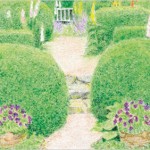The steam had run out of Page Dickey’s trowel, or so she writes at the start of this leisurely tour through the precincts and pleasures of her three-acre garden in North Salem, New York. Duck Hill, as it is known, is now in its third decade and helped secure Dickey’s place as a modestly celebrated gardening authority, even as it ate her knees and tormented her lower back. She is justly proud of her accomplishment, wishing once again to take us there, as she did in Duck Hill Journal, to see what we shall see. Now seventy years old, Dickey aims to simplify, simplify—but if William Atherton’s lovely, fine-line drawings are any indication, she hasn’t made much headway. Each of Embroidered Ground’s chapters is as compact as a sports car—”Witch Hazels,” “The Chicken House,” “Paths”—yet without any sense of rush. She lingers in the right places, explains how they came to be, introduces the citizenry: feverfew, dogwood, lady’s mantle, sweet rocket; Pennisetum, Deschampsia, Hakonechloa; enough Latinates to rekindle the Punic Wars.
Dickey employs a range of voices, often ethereal, sometimes fusty. “Prim” is a favorite word, and an atmosphere of chilled wine and tea sandwiches dominates; one longs for Eleanor Perényi to come swinging through the garden gate, glass of Scotch and cigarette in one hand, salty opinions in the other. But she is razory-wicked when facing enemies: bindweed, barberry, Norway maple, Ailanthus, bittersweet. A sensualist—fragrance undoes her—she can also be pert, as when “spherical heads of Allium christophii thrust and explode” through a wiry tangle. Ba-boom!
There is much sage advice, on sightlines, garden bones, and hedges to frame and enclose—Margery Fish, who wrote We Made a Garden, could be Dickey’s stylistic and professional mentor—and flowers, lots and lots of flowers, about which she can be existentially tender: one Viburnum “I can only describe as old-lady pink…the soft, pale rose hue of faded aprons and caked face powder.” And she loves her garden as if it were a child—with joy, distress, responsibility, guilt—which is the most beautiful thing of all.
(from the Barnes & Noble Review)
